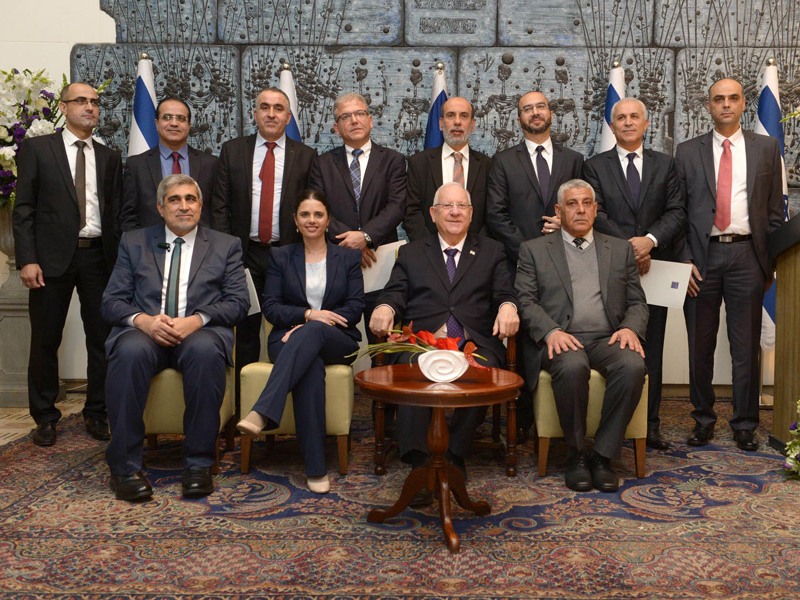President Rivlin on appointment of new Islamic Court judges
-
-
2/9/2016
GovXShortDescription
The existence of the state-supported Shariah courts in Israel, reflects the recognition of the unparalleled importance of the vitality of communities, cultures and traditions to the fabric of the life in the modern state.
-
-

 President Rivlin with the newly appointed Qadis
: GPO/Mark Neiman
President Rivlin with the newly appointed Qadis
: GPO/Mark Neiman
|
GovXContentSection
(Communicated by the President’s Spokesperson)
President of Israel Reuven Rivlin (9 February 2016) addressed a ceremony at the President's Residence marking the appointment of seven new Qadis - judges in the Muslim religious (Shariah) courts in Israel. The event was attended by Justice Minsiter Ayelet Shaked MK, as well as the President of the Shariah Court of Appeal Qadi Daoud Zini, and saw the appointment of two Shariah Court of Appeal judges, and five who will serve in the regional Shariah Courts.
The President began by congratulating all the newly appointed judges and said, "Your appointment today serves directly and tangibly the entire Muslim community of Israel. The ceremony today is especially poignant and special, as the last such appointment ceremony for Qadis held at the President's Residence was more than six years ago. Your swearing in today is a tribute to the important work of the appointment committee, whom I wish to personally thank. The new forces joining the Shariah judiciary today refresh and bring new strength and spirit to one of the oldest and most important judicial systems in the State of Israel."
The President stressed, "The existence of the state-supported Shariah courts in Israel, reflects the recognition of the unparalleled importance of the vitality of communities, cultures and traditions to the fabric of the life in the modern state. The authority of the Shariah courts - as assured by Israeli law - to me reflects the fundamental principle that an attachment to faith, to tradition, to a culture and community, is not solely the issue of the individual. Such affiliations are a basic right of a citizen in a democracy, and accordingly it is the obligation of the state to support and nurture them."
"A further challenge you face in your new role, relates to the very situation in which we are currently living. A society such as ours which is changing rapidly. A society which promotes values different to those which were the custom for generations, and which does not hesitate to be critical of tradition in the name of those values. In Egypt, in Jordan, in Sudan, in Malaysia, in the UAE, and even in the Palestinian Authority, there are a number of serving women Qadis on the Shariah courts. I pray that also in the State of Israel, the mechanism of hurdles and obstacles will be quickly removed, and we will merit to see as such an event female and male Qadis. And until we will be fortunate enough to see this, may you all be granted the ability to build bridges between the tradition and rulings of Shariah, and between the understanding that men and women are equal in every way."
The President concluded, "As you embark upon your new holy missions, I would like to close my remarks by quoting the Quran, from Sura Al-Hadid, Aya 25, as translated into Hebrew by my father, "Indeed, did We send Our apostles with all evidence of truth; and through them We bestowed revelation from on high, and gave you a balance [wherewith to weigh right and wrong], so that men might behave with equity." When the revelation and the balance is in your hands, I wish you success in preserving justice."
Minister of Justice Ayelet Shaked MK said, "When the decision to make the new appointments was made, I turned to the sub-committee for recommendations for female candidates for Qadis. This can and would be an important declaration to the Arab population and Israeli citizens as a whole. In recent years we have seen such appointments made is several Muslim countries including Jordan, Egypt and others. There is no reason why Israel, as a democratic and progressive state, would not align itself with these important winds of change, in the spirit of the Declaration of Independence, which sets forward that the state would be based upon equal rights for all its citizens regardless of religion, race, or sex. We must welcome the fact that the Arab sector is willing to support such a move and do all that is necessary to ensure equal representation for women, which will promote them to their rightful place at the forefront of the judiciary."
-
-
-
-
-
-
-
-
-
-
-
-
-
-
-
-
-
-
-